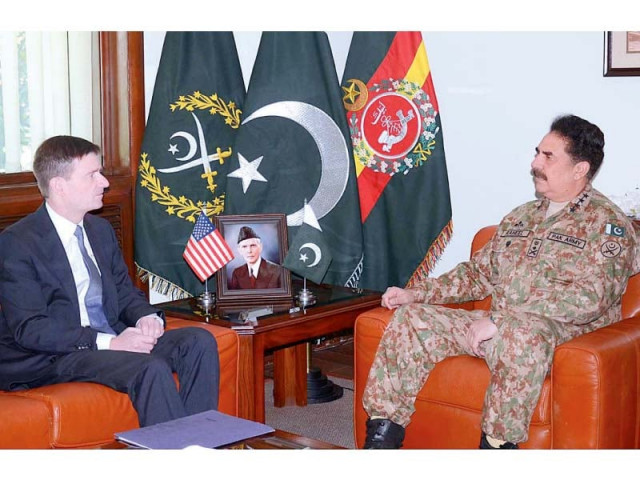Naushki attack: Drone strikes detrimental to Pak-US ties, says COAS
Acts of sovereignty violations are counter-productive to peace process, army chief tells US envoy

Gen Raheel speaks to US Ambassador David Hale at the GHQ. PHOTO: APP
On a day when the Taliban officially confirmed the death of Mansoor and picked his successor, US Ambassador David Hale met the army chief at the GHQ in Rawalpindi in an apparent attempt to pacify Pakistan and ensure his country’s relations were not affected by the episode.
Ambassador Hale’s visit to the GHQ was prompted by the situation arising out of the very rare drone strike in Naushki district of Balochistan on May 22.
The army chief expressed his ‘serious concerns’ over the drone strike, according to the Inter-Services Public Relations (ISPR). “[The] COAS said such acts of sovereignty violations are detrimental to relations between both countries and are counter-productive for ongoing peace process for regional stability,” the ISPR quoted Gen Raheel as telling the American envoy.
The army chief insisted that Pakistan’s efforts, successes and sacrifices in the fight against terrorism have been unparalleled. After initial muted reaction, Pakistan’s civil and military authorities have now made public their anger and concerns over the US drone attack.
On Monday, Pakistan summoned the US envoy to the Foreign Office to register a formal protest over the drone strike, but this was the first public reaction from the army, which is believed to have considerable sway on the Afghan policy.
A security source said the army chief was upset over the US move as he was closely involved in the Afghan peace process. The source revealed that it was due to Gen Raheel’s personal efforts that the Afghan Taliban had agreed to hold face-to-face talks with the Afghan government in July last year in Murree.
Pakistan’s civil and military authorities are said to be assessing the situation and expected to come with a firm response in coming days.
Interior Minister Chaudhry Nisar Ali Khan said on Tuesday that a meeting of the high-powered National Security Council would be convened after Prime Minister Nawaz Sharif returned to Pakistan from London to discuss the aftermath of Mansoor’s killing.
Unlike the American and Afghan claims, Pakistan insisted Mansoor was not opposed to peace talks. Instead Nisar said the slain Taliban chief was instrumental in materialising the icebreaking Murree talks.
Also on Wednesday, Defence Minister Khawaja Asif questioned the US decision to eliminate Mansoor. “The drone strike also raises serious doubts about the motives and approach being pursued to achieve peace,” he said in a statement.
While strongly condemning the US drone strike as violation of Pakistan’s sovereignty, the minister said Islamabad’s commitment to peace ‘remains unwavering.’ “Stakeholders need to synergise efforts if peace/reconciliation is the objective,” he added.
Published in The Express Tribune, May 26th, 2016.



















COMMENTS
Comments are moderated and generally will be posted if they are on-topic and not abusive.
For more information, please see our Comments FAQ